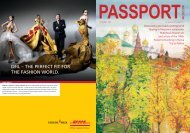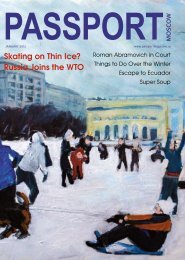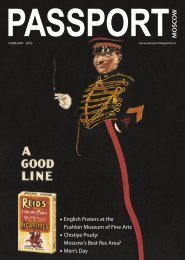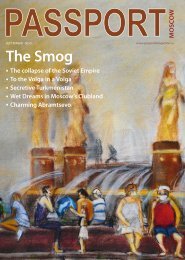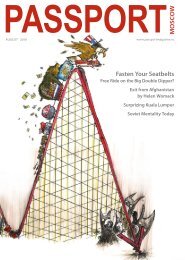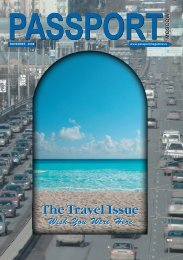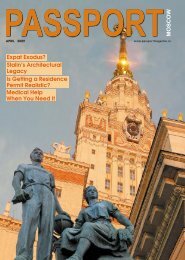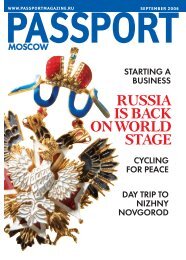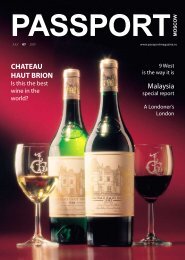Part one of Passport's guide to Moscow's favorite - Passport magazine
Part one of Passport's guide to Moscow's favorite - Passport magazine
Part one of Passport's guide to Moscow's favorite - Passport magazine
Create successful ePaper yourself
Turn your PDF publications into a flip-book with our unique Google optimized e-Paper software.
your nearest trading floor and ask the first wildebeest you<br />
meet.<br />
Pr<strong>of</strong>essor Goldman gives an his<strong>to</strong>rical perspective <strong>to</strong> his<br />
s<strong>to</strong>ry, which is both interesting and important in revealing<br />
the fictions <strong>of</strong> futurology. Back in the days when senior<br />
people in Washing<strong>to</strong>n thought that m<strong>one</strong>y was power,<br />
and laughed at those in the Soviet Union who thought<br />
that rockets and bombs represented real power, the CIA<br />
set <strong>to</strong> work <strong>to</strong> undermine the Communists’ chief cash cow,<br />
Neftegas. President Reagan’s newly appointed Direc<strong>to</strong>r <strong>of</strong><br />
the CIA, William Casey, believed that the Soviet Union was<br />
the source <strong>of</strong> most <strong>of</strong> the world’s terrorism. The logic once<br />
again was ineluctable: if the world were rid <strong>of</strong> the Soviet<br />
Union, terrorism would decrease. The fact that the opposite<br />
has happened must mean that, far from disappearing,<br />
the Soviet Union has in fact expanded. Perhaps it has become<br />
invisible. Or maybe it moved west and changed its<br />
name <strong>to</strong> the European Union.<br />
Be that as it may, the CIA’s efforts <strong>to</strong> undermine communism<br />
were based on a careful study <strong>of</strong> the Soviet Union’s energy policy<br />
and potential; the word “potential”, <strong>of</strong> course, implying another<br />
excursion in<strong>to</strong> the future. Casey based his approach on a research<br />
paper produced in 1977 by a large and well-resourced team <strong>of</strong> CIA<br />
experts who predicted that within a decade Soviet oil production<br />
would fall sharply. By 1987, the USSR would be buying around 200<br />
million <strong>to</strong>ns <strong>of</strong> oil per year on the world market.<br />
The outcome was not quite like that. Far from falling, Soviet<br />
oil output actually rose over the period, from 545 million<br />
<strong>to</strong>ns per annum in 1977 <strong>to</strong> 625 million in 1987. (Oilopoly has<br />
many informative tables and statistics.) In fact, it was only in<br />
the early 1990s, when Russia began <strong>to</strong> enjoy the benefits <strong>of</strong><br />
the capitalism which the CIA had been so concerned <strong>to</strong> force<br />
upon it, that oil production started falling sharply. By 1997, it<br />
was down <strong>to</strong> 307 million <strong>to</strong>ns, which would have been about<br />
350 million on a comparable USSR basis – a drop <strong>of</strong> about<br />
40% over the previous decade.<br />
The reason for this drop was the <strong>one</strong> fac<strong>to</strong>r which never<br />
appears <strong>to</strong> have occurred <strong>to</strong> the CIA: the owners <strong>of</strong> the<br />
new private oil companies began behaving rationally.<br />
Pr<strong>of</strong>essor Goldman describes how they came <strong>to</strong> realize<br />
that they could make more m<strong>one</strong>y by asset-stripping and<br />
sending the plundered cash abroad than by producing oil.<br />
It was only after the Casey plan <strong>to</strong> break the Soviet Union<br />
by driving the oil price down <strong>to</strong> record laws had become<br />
a distant memory, in the late 1990s that the price began<br />
rising again and the oilogarchs re-thought their position<br />
and concluded that there was potential for personal enrichment<br />
within Russia.<br />
They were helped in this by the incoming-President,<br />
Vladimir Putin, who wrote a dissertation in 1997 for the St.<br />
Petersburg Mining Institute in which he outlined his strategy<br />
for recovering lost state influence by taking control <strong>of</strong><br />
the country’s natural resources and putting them in the<br />
hands <strong>of</strong> companies which would be controlled either directly<br />
or indirectly by the state. (Goldman says that a large<br />
part <strong>of</strong> the dissertation was plagiarized from a 20-year-old<br />
American study.)<br />
Book Review<br />
The result <strong>of</strong> the close “co-operation” between the state and<br />
strategic industry has been that the owners <strong>of</strong> the companies<br />
concerned have remained free <strong>to</strong> pay themselves “market<br />
rates” for their daily labor, and <strong>to</strong> buy and sell shares and other<br />
assets – in other words <strong>to</strong> get rich – while simultaneously being<br />
protected from competitive pressures by a state which uses<br />
the law, the courts, environmental inspec<strong>to</strong>rs and all the other<br />
<strong>to</strong>ols <strong>of</strong> bureaucracy <strong>to</strong> make sure that no outside companies<br />
can face them on equal terms. The further result has been the<br />
continual plunder <strong>of</strong> Russia’s resources by the few who found<br />
themselves at the <strong>to</strong>p <strong>of</strong> the heap when Putin came <strong>to</strong> power<br />
and who wisely allowed him and his friends <strong>to</strong> join their game.<br />
There is not enough space in a short article like this <strong>to</strong> give<br />
details <strong>of</strong> how this was all d<strong>one</strong>. Suffice it <strong>to</strong> say that words<br />
like corruption, grease, persecution, lawlessness, stupidity,<br />
violence, greed, servility, more grease, bullying, aggression,<br />
illusion and even sometimes farce would be appropriate <strong>to</strong><br />
describe much <strong>of</strong> Pr<strong>of</strong>essor Goldman’s narrative after 1991.<br />
The reasons he gives are varied. One is that “the FSB is no<br />
longer just a police organization, it is a business.” Another is<br />
illustrated by the calculation <strong>of</strong> a Japanese economist who<br />
noted that it takes Gasprom $3.3 million <strong>to</strong> construct a kilometer<br />
<strong>of</strong> pipeline, when the world average cost is $1 million.<br />
The missing $2.3 million is what finances the FSB, and its clients<br />
in government and commerce.<br />
Finally, and in my view most importantly, there is the observation<br />
<strong>of</strong> a fellow Wellesley College academic who explains<br />
much <strong>of</strong> the misallocation <strong>of</strong> resources, and also the declining<br />
reputation <strong>of</strong> Russia as an international business partner, by<br />
saying that, after the fall <strong>of</strong> communism, the country lacked an<br />
adequate “moral infrastructure”. The result, Goldman writes,<br />
is that “there are few <strong>of</strong> the firmly rooted commercial laws or<br />
informal moral codes that are taken for granted in long-established<br />
market economies. The ‘rule <strong>of</strong> law’ becomes the<br />
‘law <strong>of</strong> the rulers’.”<br />
Bob Dylan famously said, “Don’t follow leaders, watch your<br />
parking meters.” The problem for Russia is that far <strong>to</strong>o many<br />
people follow leaders who are so deeply in love with m<strong>one</strong>y<br />
that they seem <strong>to</strong> lack a moral compass. But maybe we should<br />
sympathize rather than condemn. Russia is a country entirely<br />
without parking meters. P<br />
July 2009<br />
1




